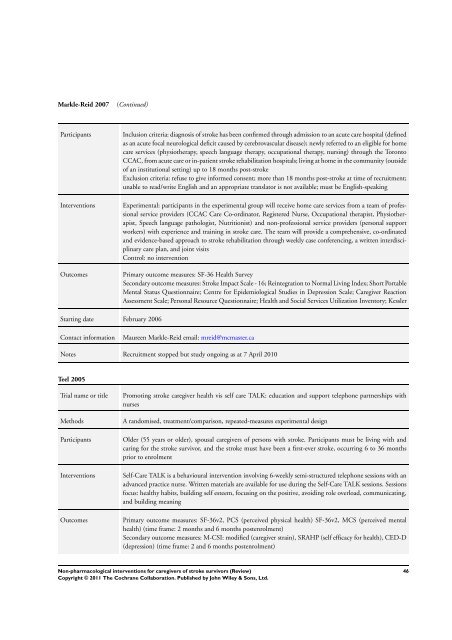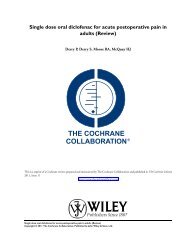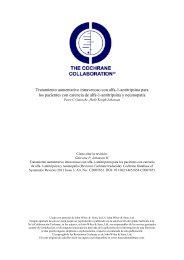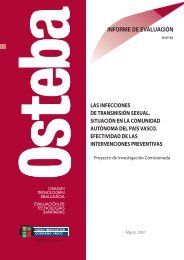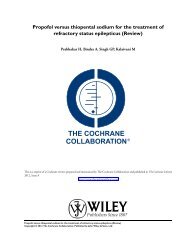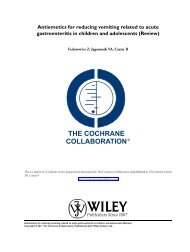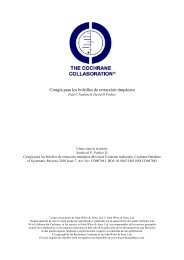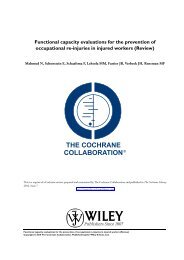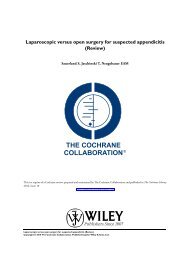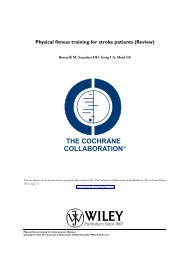Non-pharmacological interventions for caregivers ... - Update Software
Non-pharmacological interventions for caregivers ... - Update Software
Non-pharmacological interventions for caregivers ... - Update Software
Create successful ePaper yourself
Turn your PDF publications into a flip-book with our unique Google optimized e-Paper software.
Markle-Reid 2007 (Continued)<br />
Participants Inclusion criteria: diagnosis of stroke has been confirmed through admission to an acute care hospital (defined<br />
as an acute focal neurological deficit caused by cerebrovascular disease); newly referred to an eligible <strong>for</strong> home<br />
care services (physiotherapy, speech language therapy, occupational therapy, nursing) through the Toronto<br />
CCAC, from acute care or in-patient stroke rehabilitation hospitals; living at home in the community (outside<br />
of an institutional setting) up to 18 months post-stroke<br />
Exclusion criteria: refuse to give in<strong>for</strong>med consent; more than 18 months post-stroke at time of recruitment;<br />
unable to read/write English and an appropriate translator is not available; must be English-speaking<br />
Interventions Experimental: participants in the experimental group will receive home care services from a team of professional<br />
service providers (CCAC Care Co-ordinator, Registered Nurse, Occupational therapist, Physiotherapist,<br />
Speech language pathologist, Nutritionist) and non-professional service providers (personal support<br />
workers) with experience and training in stroke care. The team will provide a comprehensive, co-ordinated<br />
and evidence-based approach to stroke rehabilitation through weekly case conferencing, a written interdisciplinary<br />
care plan, and joint visits<br />
Control: no intervention<br />
Outcomes Primary outcome measures: SF-36 Health Survey<br />
Secondary outcome measures: Stroke Impact Scale - 16; Reintegration to Normal Living Index; Short Portable<br />
Mental Status Questionnaire; Centre <strong>for</strong> Epidemiological Studies in Depression Scale; Caregiver Reaction<br />
Assessment Scale; Personal Resource Questionnaire; Health and Social Services Utilization Inventory; Kessler<br />
Starting date February 2006<br />
Contact in<strong>for</strong>mation Maureen Markle-Reid email: mreid@mcmaster.ca<br />
Notes Recruitment stopped but study ongoing as at 7 April 2010<br />
Teel 2005<br />
Trial name or title Promoting stroke caregiver health vis self care TALK: education and support telephone partnerships with<br />
nurses<br />
Methods A randomised, treatment/comparison, repeated-measures experimental design<br />
Participants Older (55 years or older), spousal <strong>caregivers</strong> of persons with stroke. Participants must be living with and<br />
caring <strong>for</strong> the stroke survivor, and the stroke must have been a first-ever stroke, occurring 6 to 36 months<br />
prior to enrolment<br />
Interventions Self-Care TALK is a behavioural intervention involving 6-weekly semi-structured telephone sessions with an<br />
advanced practice nurse. Written materials are available <strong>for</strong> use during the Self-Care TALK sessions. Sessions<br />
focus: healthy habits, building self esteem, focusing on the positive, avoiding role overload, communicating,<br />
and building meaning<br />
Outcomes Primary outcome measures: SF-36v2, PCS (perceived physical health) SF-36v2, MCS (perceived mental<br />
health) (time frame: 2 months and 6 months postenrolment)<br />
Secondary outcome measures: M-CSI: modified (caregiver strain), SRAHP (self efficacy <strong>for</strong> health), CED-D<br />
(depression) (time frame: 2 and 6 months postenrolment)<br />
<strong>Non</strong>-<strong>pharmacological</strong> <strong>interventions</strong> <strong>for</strong> <strong>caregivers</strong> of stroke survivors (Review)<br />
Copyright © 2011 The Cochrane Collaboration. Published by John Wiley & Sons, Ltd.<br />
46


